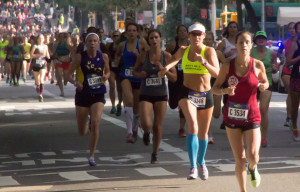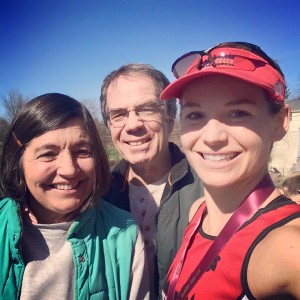
With being “unattached” for this race, it was the perfect opportunity to wear Danielle Sepulveres’ “Don’t Be A Bridesmaid” sports bra.
Today’s blog is all about mistakes, and learning from them. I happen to believe and preach to my athletes that there is no such thing as a bad run or race, as long as we learn from it. Yes, we all will experience runs and races we’d define as terrible. Chin up, they happen. But if you learn something – be it pacing, mental focus, what to wear, eat, whatever – those lessons prepare you for better runs and races in the future. Sadly, those lessons are rarely fun and usually are often the clearest on bad runs and races. Funny how the good races don’t teach us half the lessons as the bad ones.
This weekend, Corky had a bad race. Yes, I could get pissed, embarrassed, and admit to myself how bummed I am. Cause I am bummed. I knew on a good day, that fast mile down Fifth Avenue was mine to screw up – I am stronger and mentally more focused now than I have been in a long time – but we are also sometimes our own demise. Perhaps being a coach has forced me to really grow up and take every experience in stride, maybe I’m simply older and wiser and have learned to not sweat the small stuff. Either way, I am choosing to take this disappointing race as an example of what you should not do, and what you should do.
On Friday evening, I felt a little tickle in my throat. You know that feeling, the “Oh no, here comes a cold” feeling. I was en route to see Hedwig and the Angry Inch on Broadway (hello, Taye Diggs!), and so I powered through the night. I crashed out as soon as I got home, hopeful that catching up on sleep would help. Unfortunately, Saturday I awoke feeling worse. Even 11 hours of sleep couldn’t knock this bug out. I didn’t feel terrible, just a little ill. I coached, worked on training plans, and did my best to power through the day. By 7 pm, I felt pretty terrible. At that time I made a bad decision. I ordered Chinese food (hot and sour soup sounded like a good idea), made some tea, and took NyQuil – thinking I’d be fine with a race over 13 hours away. Wrong.
Lesson learned: DO NOT take NyQuil the night before a race – ever. Yes, I slept like a baby. I also felt almost drunk when my alarm went off at 7:30am. I ate a banana and drank some water, hoping that would help. No luck. When we left our apartment for the race at 8:15am, I told myself to relax – I had almost another whole hour to feel normal before my heat in the Fifth Ave Mile. No better. I jogged the mile up to the starting line, pausing to chat with a few familiar faces. You know how sometimes you are feeling a bit tipsy at a party and you do your best to cover it up? Yeah, that’s how I felt. My head was in a fog and my body felt completely disconnected from my head.
At the starting line, I had enough sense to get up towards the front. I tried to tell myself to focus, put on those race blinders, and run really hard for one mile. One mile – that’s all I needed to will my body to do! It sounded so simple. When the gun went off, I knew I was in trouble. Those first few steps felt like I was running through cement. My legs almost hurt, they felt so heavy – and not in the track workout legs-on-fire hurt – this is was odd and foreign. My mouth felt like cotton from the first breath, even though I had just sipped water prior to the start. Looking back, I hardly remember that mile. I do remember feeling absolutely no control over my body, no mental will to push, and total separation between body and foggy brain. My drive to run hard – couldn’t find it. Though I know I worked out there, I don’t recall my lungs working hard or my legs burning from speed. When I crossed the finish line in my slowest mile ever (5:47), I didn’t even feel disappointment. I didn’t feel tired. I didn’t feel.
If you are sick for a race, that’s a tough place to be in. My advice is to be VERY cautious when thinking about medicating. Our bodies can be extremely sensitive. When sick, you also need to change your race day goals, which is really hard. Did I know a PR was out of the cards this morning – yes, I felt it. But did I secretly hold onto hope I could magically pull through? Yes, I sure did. This isn’t because I am delusional or an optimist with blinders – but it’s because I know in order to achieve your goals, you need to believe you can. Plus with strength training this past 6 months my lower body, I knew I was stepping up to the line with some additional power. But I should have changed my goals the minute I woke up this morning. And I should never have taken NyQuil.
So if you are sick the weekend of a race, there are a few things you can do:
- Get sleep
- Stay hydrated
- Modify race goals
- Be honest with your expectations and potential on race day
- Remind yourself that just getting out there when sick can be a victory
And there are some things you should not do:
- Expect a PR or refuse to modify goals
- Take medication without being sure how it will affect you and your performance
- Consume alcohol or anything that could dehydrate you
- Beat yourself up if your goals are not attainable
And remember, if you stay healthy you will have many more races in the future. A bad race here or there does not define you as a person or an athlete, so learn from your mistakes and move on. As for me, I’ll never take medication the night before a race ever again.




